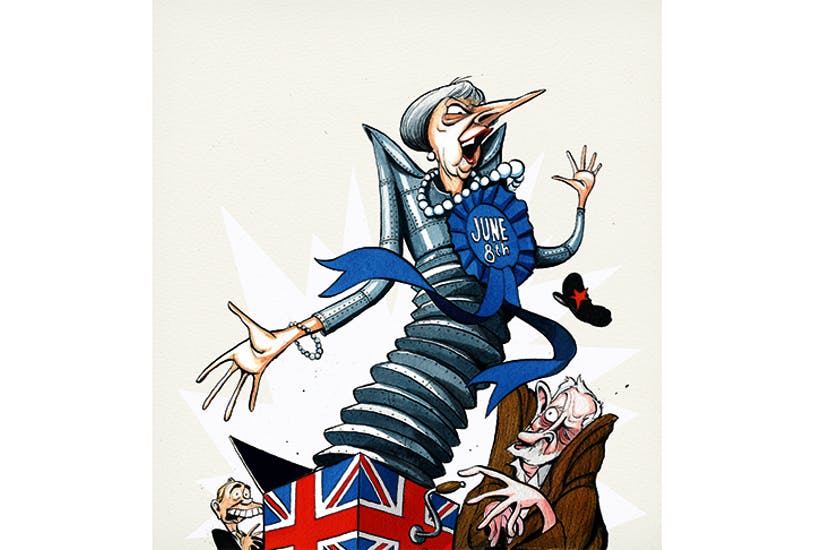On this week’s episode, we discuss the two European nations that are are heading for the polls in the next couple of months. First, we look at Theresa May’s shock decision to hold a snap election, and then we cross the channel to consider the French election as they get set to whittle the field down to just two.
With British news set to be dominated until June 8th by election fever (yet again), there was no place to start this week but with the fallout from the Prime Minister’s stunning U-turn on an early election. It’s a gamble, James Forsyth says in his cover piece this week, but with a portentially enormous pay off. James joins the podcast along with Bobby Duffy from Ipsos MORI and Richard Angell director of Progress.
As James writes in his cover piece:
“Brexit and Jeremy Corbyn’s leadership have given Theresa May a chance to shift a substantial number of traditional Labour voters into the Tory column. She can steal a large chunk of Labour’s working-class, patriotic base who won’t fancy voting for a man who courted the IRA as they killed British soldiers and who calls Hamas and Hezbollah his friends. Her ‘third way’ between nationalism and globalism, with its emphasis on making globalisation work for those who feel left behind, gives her more of an appeal to these voters than any Tory leader this century.
The polls support James’s prognosis, says Bobby:
“It just seems like a good thing to do. There’s a lot of talk of this being a gamble for Theresa May, but it’s hard to see what that gamble is particularly right now. The polls are showing that she’s got a 21 point lead. We’re always told “don’t look at leads, look at shares”, but if you look at the share it’s 45, 46 per cent and that’s the same sort of lead that Margaret Thatcher had in 1983 and Tony Blair had in 1997.”
Whilst on Labour, Richard is more optimistic:
“If you’re a Labour MP right now, you’ve done in against the odds in 2010, against the odds in 2015, or you came in in one of those elections and the public have kept you there. So I really think, in that sense, our Labour MPs are where the hope is and the fact that some of those bigger picture things aren’t in question means that, in certain seats around the country, they can have the “is my MP really good at standing up for my area?” and that’s where I think you might get not as much change as the top-level figures suggest.”
But before we find out whether Theresa May has clung onto her office, we’ll discover who’ll be the next resident of the Élysée Palace. For some time now, it has seemed as thought Marine Le Pen and Emmaunel Macron are headed for the run-off, but with François Fillon and Jean-Luc Mélenchon hanging on, are things as clear cut as they seemed? To discuss this, we brought together Jonathan Fenby, author of The History of Modern France, and Aline-Florence Manent, a French political historian based in London.
As Jonathan tells the podcast:
“Yes, there’s an air of resignation or weariness. The question I think, this year, which is very interesting, is whether that is translating, finally, to a shake-up of the political landscape. The Socialist party has more or less imploded and is likely to finish fifth in the Presidential poll, and three of the four leading candidates come from outside the regular political establishment. So it’s a time for change.”
But Aline-Florence sees more than just despair:
“What is also striking is that yes, on the one hand we have this gloomy mood which is palpable, even from London, but there’s also something else going on and that’s maybe not so visible, which is also the vibrancy which exists among French voters. They are interested, they are reading, they are listening to the candidates, to the debates.”
The Spectator Podcast will be appearing in its regular Thursday slot throughout the election campaign, but we’ll also be providing you with daily editions of Coffee House Shots, our political podcast, so do subscribe on iTunes to get our take on the latest twists and turns as soon as they happen.
This podcast is sponsored by Berry Bros. & Rudd, who have long supplied wine for The Spectator. If you’ve always wanted to start a wine cellar, 2017 could be the perfect time. Whether you are looking to buy for future drinking, for investment or a little of both, Berry Bros. & Rudd’s Cellar Plan is designed to suit all tastes and budgets. A personal Account Manager will be on hand to offer advice and assistance, and enable you to benefit from three centuries’ worth of relationships with the leading wine growers. To find out more about starting a wine cellar with Berry Bros. & Rudd, visit bbr.com/cellarplan










Comments